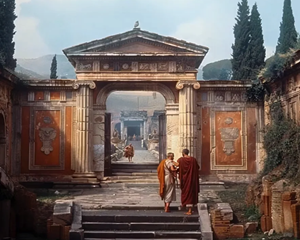Team member Julian Schilliger, 29, a computer scientist in Basel, Switzerland, worked on how to digitally "unroll" the scroll, whose layers were visible in thousands of cross sections of the 3D scan.
团队成员朱利安·席利格29岁,是一个来自瑞士巴塞尔的计算机科学家,他致力于用数字化的方式“展开”卷轴,卷轴层在3D扫描的数千个横截面中是可见的。
Individual layers had to be traced through the cross sections and digitally "flattened" -- its own labor-intensive procedure.
单独的层必须通过横截面来描绘,然后经过数字化“压平”处理--这本身就是一个劳动密集型的过程。
Schilliger developed a method using AI to help automate the process.
席利格开发了一种使用人工智能来自动化处理这个过程的方法。
He created a model that identified which points in the scan were adjacent on segments of the scroll layers.
他创建了一个模型,可以识别扫描图中的哪些点在卷轴层的段落上是相邻的。
"That was like a big aha moment for everyone, that you can do it automatically," he says.
他说:“这就像一个惊喜时刻,你可以自动完成。”
Enthralled papyrologists determined the columns the team revealed are part of a meditation on pleasure, likely written by Philodemus.
欣喜若狂的纸莎草学家们认定,该团队展示的几列文本是对于愉悦的一段思考,很可能是由菲洛德默斯所写。
One fragment reads, "in the case of food, we do not right away believe things that are scarce to be absolutely more pleasant than those which are abundant."
其中一段话写道:“对于食物而言,我们不会立即相信稀缺的东西绝对比那些富足的东西更令人愉悦。”

As the challenge nears the end of its second year, organizers have set new goals: to read 90 percent of four scrolls, up from 5 percent of one scroll in 2023, and to scale up the techniques pioneered in the first year.
随着挑战赛的第二年接近尾声,组织方设定了新的目标:从2023年的一卷轴的5%上升到四卷轴的90%,并扩大第一年率先采用的技术。
Increased automation will be crucial to reading the roughly 300 intact scrolls, and perhaps thousands more.
提高自动化程度对于阅读大约300卷完整的卷轴至关重要,也许还有数千卷。
"I absolutely believe that this problem will be solved and we'll be scanning these things and pressing a button, and 90 percent of it will just, boom, come out," Seales says.
“我非常相信这个问题会得到解决,我们会扫描这些东西,按下一个按钮,90%的东西就会砰地一声出来,”西尔斯说。
The progress so far has thrilled the classics world and left scholars eager to learn what more these recovered relics might have to say.
目前所取得的进展让古典学界感到兴奋,学者们急切地想知道这些复原的遗迹还有什么要说的。
"When we were first shown the text that AI had revealed, it was a moment of utter astonishment," says Robert Fowler, chair of the Herculaneum Society in Oxford, England, which supports conservation of the villa site.
英国牛津赫库兰尼姆协会主席罗伯特·福勒说:“当我们第一次看到人工智能展示的文本时,这简直是一个让人大开眼界的时刻。
"The ability to do this now and to reach across the millennia and dip into not just a single book but a library... it's connecting with eternity."
现在能够做到这一点,能够跨越千年时光,浏览一本书乃至一整个图书馆...这是与永恒相连。”













